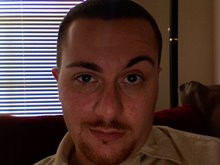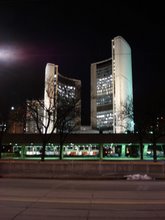4.20.2007
Interesting and Random Thoughts
"The 2000 presidential election between George W. Bush and Al Gore brought to our attention the problems involved with counting votes. Dangling chads notwithstanding, political scientists have long been aware that there are much deeper problems with voting systems; problems so fundamental they leave us scratching our heads and asking what's going on.
Trouble first surfaced during the Enlightenment, as Jean-Charles de Borda and the Marquis de Condorcet debated the merits of different voting schemes. But it was not until 1951 that Nobel laureate Kenneth Arrow fully laid bare a problem that Borda and Condorcet had been struggling with.
Borda advocated letting people rank each candidate with a number, adding the points, and choosing the candidate with the best total score. We could view the method of voting we use today as a special case of Borda's method -- where our favorite candidate re-ceives one point and everyone else receives none.
Condorcet, on the other hand, advocated a vote between every pair of candidates. The candidate that wins in every comparison is elected. The practical problem with Condorcet's method is that it may fail to produce a winner. We see this all the time in athletic competitions. The Astros beat the Reds, the Reds beat the Cubs, and the Cubs beat the Astros. Who's the winner? In voting, this is known as Condorcet's Paradox.
But there's a hidden problem in Borda's method of numerical ranking, too. Imagine Smith and Jones are running for office, we cast our votes, and Smith wins. Now suppose a new candidate enters the election and we vote again. Even if we all feel the same way about Smith and Jones, we may find Jones now wins. This is a very real problem in U.S. elections, and the democratic and republican parties constantly worry about candidates from third parties claiming votes.
The fact that candidates entering or leaving the race can change the order of the remaining candidates is very alarming. If I prefer chocolate ice cream to vanilla, and someone offers me strawberry ice cream, why should I now prefer vanilla to chocolate? Yet this is exactly what can happen with Borda's method. We might ask if there is a voting system -- any system at all -- that doesn't threaten to flip-flop the two candidates, when a third can-didate enters the race. Remarkably, Arrow proved that for any system meeting the most basic standards of common sense, the answer is No.
The implications for voting are stunning. But the impact of Arrow's work on economics and social choice goes far deeper. If we can't combine individual preferences in any reasonable way, can we even talk about society's preferences? If we can't talk about society's preferences, how can we develop economic or social policies and claim they represent what society prefers?
Arrow did more than prove a result that now bears his name. Like many of the best results in science, engineering, and mathe-matics, Arrow's theorem distills a known problem into its most basic pieces, and, in doing so, helps us see the world in a surprising new way."
4.07.2007
...and his wish was granted.
At first, Buddy was hesitant about moving to Corpus. Most people here that he's talked to haven't had many nice things to say about it, which influenced his judgment. Eventually he came around and it was based on a few key points. Number one, the people saying negative things about Corpus were also people who liked the Valley. Most of them say negative things about Houston or other places we like to. So, that negative influence was coming from unaccredited sources. Number two, we actually WENT to Corpus and he loved it. Even with the rain, he had a good weekend. Number three, he found out he knows (or will know due to transfer) a couple of people at the Starbucks. That made all the difference in the world for him.
For me, this has been relatively easy to get excited over. It's out of the Valley, it's a new challenge at work, it's three hours closer to home, etc. Corpus is only a couple of hours from San Antonio and three hours from Austin. There are things to DO in Corpus. The people are nicer and more polite. It isn't Toronto or Denver or Seattle or other places we've looked, but it's a great city on it's own.
Work is going to be interesting for a while. I'm currently running the center in Brownsville and the one in Corpus Christi. They're 150 miles apart, so that means that I am driving back and forth each week. 3-4 days in Corpus Christi, 1-2 in Brownsville, weekends at home. We'll see how it works out over the next month but I'm already tired and I've only done it a week. Brownsville is fairly easy to manage but Corpus is a real train wreck right now. There are SO many things that need to be fixed and they're all important. It's difficult to figure out where to start.
I have a staffing issue in both stores right now. I need to hire four people in Corpus Christi and one in Brownsville. One of the main production operators in the morning at Corpus is about to be out for three months. One of the part time people and the Assistant Manager at Brownsville both want to transfer at the beginning of June. Both stores are needing people BEFORE those people leave, not to mention replacements.
I have to get a new team member brought on board and trained from 150 miles away, I've got last minute conference calls being set up to help improve the failing customer service scores in Corpus. I wish I didn't have to get on since I'm currently #11 in the company in Brownsville, but it is what it is. I found out I have to go to Dallas for a day long training class on the Sign & Graphic department I inherited with Corpus Christi. That will be beneficial, but with all the stress I've got right now, flying to Dallas at 5am and back to Corpus at 10pm in the same day will be ugly. But once again, it is what it is.
Eventually, all of this will pay off in a big way for me. I just have to make it through this rough patch. The scary thing is, all of this is happening now and as I've said, I've only been on the job there for less than a full week. What will happen over the next three - four weeks?
4.01.2007
Wow ... I mean ... just ... wow. Welcome to Texas.
Husband kills wife's lover; wife charged
POSTED: 6:45 p.m. EDT, March 30, 2007
Story Highlights
• Caught with lover, wife cries rape; husband shoots fleeing man• Grand jury charges woman with manslaughter
• Texas law exonerates those who believe actions are justified at time
• Wife also charged with making false report to police
ARLINGTON, Texas (AP) -- Darrell Roberson came home from a card game late one night to find his wife rolling around with another man in a pickup truck in the driveway.
Caught in the act with her lover, Tracy Denise Roberson -- thinking quickly, if not clearly -- cried rape, authorities say. Her husband pulled a gun and killed the other man with a shot to the head.
On Thursday, a grand jury handed up a manslaughter indictment -- against the wife, not the husband.
The grand jury declined to charge the husband with murder, the charge on which he was arrested by police.
"If I found somebody with my wife or with my kids in my house, there's no telling what I might do," said Juan Muniz, 33, who was having lunch Friday with one of his two small children at a restaurant in the middle-class suburban Dallas neighborhood where the Robersons lived. "I probably would have done the same thing."
Tracy Roberson, 35, could get two to 20 years in prison in the slaying of Devin LaSalle, a 32-year-old UPS employee.
Assistant District Attorney Sean Colston declined to comment on specifics of the case or the grand jury proceedings but said Texas law allows a defendant to claim justification if he has "a reasonable belief that his actions are necessary, even though what they believe at the time turns out not to be true."
Mark Osler, a Baylor University law school professor and a former federal prosecutor, said the grand jurors evidently put themselves in the husband's place: "I can see one of them saying, 'I would have shot the guy, too. I was just protecting my wife.' "
The December night before the shooting, Tracy Roberson sent LaSalle a text message that read in part, "Hi friend, come see me please! I need to feel your warm embrace!" according to court papers. LaSalle apparently agreed.
Darrell Roberson, a 38-year-old employee of a real estate firm, discovered the two, his wife clad in a robe and underwear.
When Tracy Roberson cried that she was being raped, LaSalle tried to drive away and her husband drew the gun he happened to be carrying and fired several shots at the truck, authorities said.
Darrell Roberson's attorney did not immediately return a call for comment.
His wife also was charged with making a false report to a police officer -- for allegedly saying she was raped -- and could get up to six months behind bars on that offense. It was not immediately clear whether she had a lawyer.
She had not been arrested as of Friday afternoon.
Copyright 2007 The Associated Press. All rights reserved.

